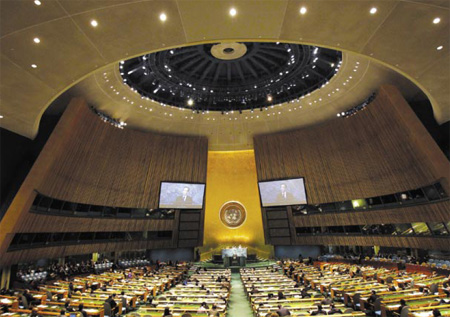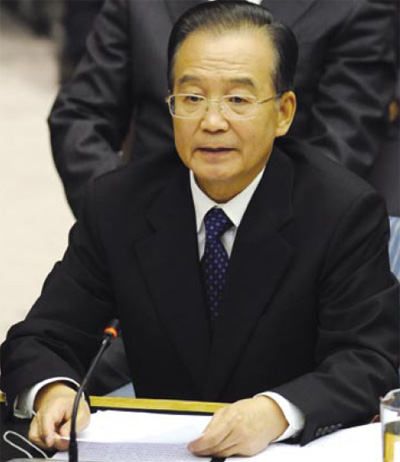Top News
China to focus on peaceful rise
By Wu Jiao and Zhang Yuwei (China Daily)
Updated: 2010-09-24 11:24
 |
Large Medium Small |
|
Premier Wen Jiabao (seen on screen) addresses the 65th United Nations General Assembly at the UN headquarters in New York on Thursday. Mike Segar / Reuters |
|
Premier Wen Jiabao addresses the United Nations Security Council during a meeting at the UN headquarters in New York on Thursday. Shen Hong/Xinhua |
No intention to seek hegemonic status in world affairs: Wen
UNITED NATIONS - China will continue to seek peaceful development despite its economic clout, and will never become a hegemonic power, Premier Wen Jiabao said on Thursday.
Addressing the general debate of the 65th session of the UN General Assembly, Wen took the opportunity to depict a true picture of China, which was the title of his speech, to the world audience.
The remarks have come in the backdrop of growing suspicion in the West about China seeking hegemonic status in light of its speedy development, especially since the Chinese economy had just overtaken Japan's as the world's second largest.
Western observers have recently been portraying China as arrogant and heavy-handed, especially in handling some nagging disputes with other nations.
At the same time, some countries have been urging China to adopt a stronger international role and shoulder more responsibility in world affairs, a demand that China finds hard to fulfill at present.
Addressing these notions, Wen told the assembly that despite its growing economic weight, the per capita GDP of the country was only one-tenth that of developed nations.
Regional imbalances, a population of nearly 150 million impoverished people, low-end manufacturing industry and inadequate social democracy were further proof that China was still a developing country, Wen said.
China's success in battling poverty during the last 25 years has been "undeniable", Ajay Chhibber, UN assistant-secretary-general and UNDP administrator and director for Asia and the Pacific, told China Daily.
He, however, warned that China's growing income inequality, on the rise since the mid-1980s, was a cause for concern.
"China will need to address this problem if it is to maintain its past rate of progress against poverty," he told China Daily.
China is, however, rightly focusing on social protection in its efforts to ensure that those left behind were getting support, he added.
Sarah Cook, director of the United Nations Research Institute for Social Development, said China's social assistance programs have improved over the past years.
"These benefits (from the programs) have become an entitlement for people and everyone whose incomes fall below a certain level can get access to it," said Cook, a China expert who had lived in the country for many years.
She said the improved system was part of growing awareness about people's rights and their ability to demand things from the government.
In the speech, Wen said that, for a long time to come, China would continue to focus on developing its domestic economy, which should serve as the foundation for solving other problems in the country.
China will continue to expand its reform and opening-up policies, which have been crucial to the remarkable economic achievements made so far, he said.
Yet, China's development will pose no threat to other countries, and the nation will not seek hegemony despite its growing strength, Wen added.
He, however, warned that the country will not concede or compromise on issues related to its core interests.
Commenting on Wen's speech, Jamie Metzl, executive vice-president of Asia Society, said although China sees itself as a developing country, the world does not see it that way. Metzl said China "can and must do better" to be "part of the solution to global challenges".
Metzl, an expert on Southeast Asian history and politics, told China Daily: "Because of China's global importance, it needs to be part of the solution to global challengesWhen China doesn't play this role, for whatever domestic reason, it deeply undermines the functioning of the global system."
Along with its achievements in poverty reduction and economic prosperity in the past decades, China has been helping other developing countries and least developed countries in many areas.
UN Secretary-General Ban Ki-moon recently praised the economic assistance that China has been providing to many developing countries and African nations. He said that the successful way in which China had achieved many Millennium Development Goals, and in other areas, "should be emulated by many developing countries".
At the general debate, Wen reaffirmed this.
"China will continue to cooperate with developing countries, and devote itself to enlarging the discourse power of developing countries in global affairs," Wen said.
Meanwhile, in a separate address to the UN Security Council the same day, Wen also called upon the UNSC to further enhance its role in the global multilateral security mechanism.
As the core of the world communal security mechanism, the UN should further enhance its authority, shoulder more responsibility in preserving world peace and security, make further efforts and exert a greater role, Wen said.
Wen's remarks have come against the backdrop of the growing dominance of a number of multilateral security organizations dominated by developed nations, such as the NATO, which have marginalized the role of developing countries in global security affairs.
The council must, as a matter of priority, resolve problems in Africa, since most issues on the council's agenda related to that region, Wen said.
In the quest for world peace, hotspots in Africa must be addressed, he said, stressing that the international community must accommodate the concerns of African countries and respect their choices.
China has played an active role in UN peacekeeping operations, he said, pointing out that the nation was the largest contributor of peacekeeping personnel among the council's permanent members.
Noting that China appreciated the value of peace, Wen said China would, as a permanent member of the UNSC, continue to get engaged in missions to build and preserve peace.
China Daily

